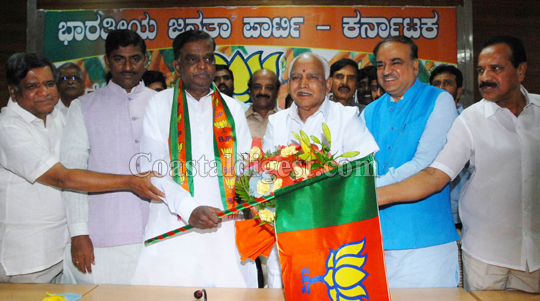Bengaluru, Jan 3: Party hopper V Srinivas Prasad, who recently quit as Congress MLA and formally joined BJP on Monday, claimed that he intends to retire in a dignified manner from politics.

"This is my last leg in politics, I know that. I am not hungry for power or fame. I only want an honourable exit from politics," Prasad told reporters after joining BJP here.
Prasad, once a confidant of chief minister Siddaramaiah, resigned from his assembly seat and the Congress, after he was dropped during the cabinet reshuffle in June 2016.
Stating that the impending bypoll to the Nanjangud assembly constituency, which he represented, will be his last election, Prasad said he was hurt by the attitude of Congress and Siddaramaiah.
"Nobody anticipated this moment. Neither I nor you (BJP) could have foreseen this situation. But here we are, and my only assurance of joining the BJP is that I should not be treated the way Congress treated me," he said.
Showering praises on the saffron party, Prasad said that BJP could not have won the mandate of the people to run the nation if it was “anti-Dalit”.
“The BJP?not only emerged as the single largest party but also secured majority on its own in the Lok?Sabha elections in 2014. This could not have been achieved without the support of Dalits,” he said. Prasad said he joined the BJP?as he appreciated and agreed with the “politics of social concern and commitment” practised by Prime Minister Narendra Modi.
“Programmes such as Swachh Bharat and Mann Ki Baat appealed to me and I appreciated Modi. This went against me in the Congress,” he added.
Prasad officially joined the BJP?by receiving the party flag from state unit president B?S?Yeddyurappa in?Bengaluru. Prasad also paid the requisite fee of Rs 5 to enrol as a primary member of the BJP. The event portrayed a show of unity among the state BJP leaders with most of the prominent faces including K S?Eshwarappa being present.









Comments
Besharam Janatha Party..
Bjp wins or not in next election, I got my cash.... Kalli walli people are fools to believe us politicians ... Ha Ha ha
This man is like a Girgit who changes its color based on environment and situation. Till yesterday this man was blaming bjp and today he is praising the party. Tomorrow he will jump to another party and blame bjp. We cant and should not trust politicians as they have no faith and trust. Money and seat are their belief.
Add new comment